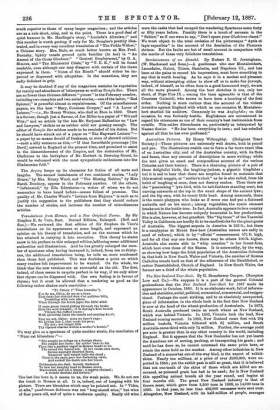The Hew Zealand Year - Book. By H. Stonehewer Coo per. (Sampson
Low and Co.)—We suppose it is a part of the general Colonial goaheadnesa that the New Zealand Year-Book for 1887 made its appearance in October, 1886. It is an elaborate work, fall of informa- tion and statistics, social, political, economical, commercial, and emigre- tional. Perhaps the most striking, and to us absolutely unexpected, piece of information in the whole book is the fact that New Zealand is now at the head of the wheat-production of Australasia. In 1873, South Australia produced twice as much wheat as New Zealand, which was behind Victoria. In 1882, Victoria took the lead, New Zealand coming second. In 1883, New Zealand came first with 10* million bushels, Victoria followed with 8* million, and South Australia came third with only 7t million. Farther, the average yield per acre is greater than in any other country in the world, including England. But it appears that the New Zealander has not yet learnt the American art of sorting, packing, or transporting his grain ; and until he has done so, he cannot command the same price here, or retain the same bold on the market. Among ether industries in New Zealand of a somewhat oat-of-the-way kind, is the export of rabbit- skins. Nearly ten millions, at a price of over £100,000, were ex- ported in 1884 ; yet the rabbit pest is still so great, that it is believed that not one-tenth of the skins of those which are killed are re- covered, as poisoned grain has had to be used ; for in New Zealand this appalling animal breeds all the year round, and begins at four months old. The great New Zealand industry is that of frozen meat, which grew from 3,300 tons in 1883, to 14,000 tons in 1885. In that year, no less than 492,000 carcasses were sent over. Altogether, New Zealand, with its half-million of people, manages to make a very good show. First in grain, third in wool, and first in frozen meat, is not a bad record among the Australasian Colonies. But in spite of its climate and its energy, we cannot recognise the claim of New Zealand to the title of the " England of the South" while it puts a 15 per cent. ad valorem duty on every manu- factured article which is not itself regarded as an implement of manufacture. It is clearly a protective tariff, as ironmongery, clothes, glass, and other things whioh it is at all likely may be pro- duced in New Zealand, are charged 15 per cent., while artificial teeth, theodolites, and lawn-mowers, to take three articles selected at hap- hazard not likely to be produced in a new country, are admitted free• And we mint protest against the vicious practice of interleaving a book with advertisements, no that while you are reading about granite, you suddenly find yourself confronted with a "safety fuse." The Works of Horace. Translated by the Rev. J. C. Elgood. (Wyman and Sone.)—We do not think that Mr. Elgood has succeeded in making his translation "attractive and of interest" to "the large body of intelligent Englishmen and Englishwomen unacquainted with the Latin tongue." A poet can hardly be made attractive in prose, and certainly not in prose of this kind, so void of form and rhythm. And we are sure that he does not "give the accurate meaning of the language of the poet." Where there is a real erica, he sometimes fails. A well-known difficulty, not of a very abstrose kind, indeed, but sufficient to entangle a beginner, occurs in Epode XVI. :—



































 Previous page
Previous page